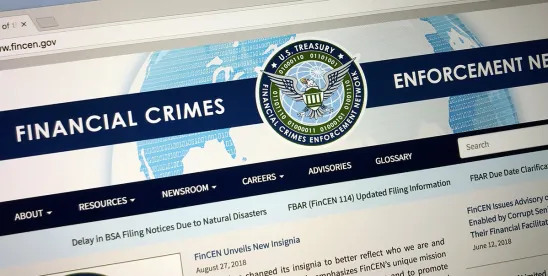A new FinCEN rule aims to crack down on money laundering through real estate by requiring certain persons to report high-risk real estate transfers to FinCEN.
Key Takeaways:
- Criminals often favor money laundering through residential real estate because non-financed transfers of residential real estate allow them to avoid government scrutiny
- The FinCEN rule expands Bank Secrecy Act reporting requirements to real estate professionals
- Violations of the rule can be reported under the AML Whistleblower Program
- The final rule will take effect on December 1, 2025
The Financial Crimes Enforcement Network (FinCEN), a bureau within the United States Department of Treasury, has issued a new investment advisor rule to protect residential real estate from illicit finance, such as money laundering. Criminals often favor money laundering through residential real estate because non-financed transfers (including “all-cash” sales) of residential real estate allow them to avoid government scrutiny. FinCEN’s new rule aims to increase transparency by requiring certain defined persons, such as real estate or escrow agents involved in real estate transfers, to report to FinCEN about specific high-risk transfers. The final investment adviser rule also standardizes anti-money laundering/countering the financing of terrorism (AML/CFT) requirements across the real estate industry by obligating advisers registered with the U.S. Securities and Exchange Commission (SEC) to report compliance and suspicious activity. The final rule will take effect on December 1, 2025.
Obligations Under the Final Rule
FinCEN is one of many federal agencies tasked with enforcing the Anti-Money Laundering provision, which has jurisdiction over the Bank Secrecy Act (BSA). The new rule furthers their mission of safeguarding the financial system from illicit activity by expanding the reporting obligations of the BSA to residential real estate professionals. The new rule intersects with two major violations of the AML Act that FinCEN enforces: (1) failure to file required reports and recordkeeping violations, and (2) failure to file the Real Estate Report. Come December 2025, failure to file either of these will result in an enforceable violation of the new rule. The reporting will need to person provide information about the transfer of residential real property, including:
- The reporting person;
- The legal entity (transferee entity) or trust (transferee trust) receiving ownership of the property; ex. Limited liability company (LLC)
- The beneficial owners of the transferee entity or transferee trust;
- Certain individuals signing documents on behalf of the transferee entity or transferee trust during the reportable transfer;
- The transferor (e.g., the seller);
- The residential real property is being transferred, and
- Total consideration and certain information about any payments made.
By requiring the reporter to know and disclose the identity of the above parties involved in transfers, illicit actors using shell companies or other anonymous means of laundering money through real estate transfers may be easier to expose. The new rule utilizes a reporting cascade to designate reporting responsibility. Essentially, the reporting cascade delineates a list of seven different functions that a real estate professional may perform in a reportable transfer of residential real property and if they must report based on that function.
Impact
The new rule could lead to a significant increase in AML violations for a multitude of reasons. The complicated designation of reporting responsibility, the vague scope of what qualifies as reportable or not, as well as the inability or refusal of real estate professionals to provide sufficient information about their clients could contribute to an increase in violations. As real estate professionals begin to incorporate the new rule, both understanding and implementing a mandate of this complexity will likely pose a substantial burden on real estate professionals, especially small business owners. Deliberately choosing not to shoulder this burden or simply failing to report suspicious activity would lead to a significant increase in AML violations. On the other hand, a desire to not trigger the complicated mandates of the rule may serve as a deterrent to real estate professionals to avoid engaging with unidentifiable and potentially criminal actors. While the rule may increase the administrative burden, it may also help stabilize the residential real estate market as the influx of dirty money ceases to enter.
The final rule may bolster ongoing efforts in different states to limit money laundering through real estate transfers. In 2022, two New York lawmakers introduced legislation that would require any person purchasing property in New York through a Limited Liability Company, or LLC, to disclose their identity to the state and include the information in their tax returns. LLCs allow property buyers to mask their identity but will be required to be identified as a transferee entity under the final rule. New York has long struggled with foreign money laundering into luxury real estate properties through anonymous shell companies and LLCs. While the legislation has yet to pass, FinCEN’s new rule may finally assist in addressing the long-standing issue.
Implications for Foreign Money Laundering
By creating and expanding new regulations through this rule, FinCEN expands the jurisdiction of the AML Whistleblower Program to residential real estate. Money laundering is historically difficult to detect, the government often relies on whistleblowers to inform them of illicit activity. Any failure of residential real estate professionals to follow the new rule is a violation that insiders can report under the AML Whistleblower Program. Whistleblowers who provide the U.S. Department of Treasury with information regarding violations of the Bank Secrecy Act (BSA) may receive an award of up to 30% of monetary sanctions obtained from a successful investigation. Outside of self-reporting, FinCEN relies on AML whistleblowers to hold real estate professionals accountable and detect money laundering.
The rule could have major implications internationally. On January 25, 2023, FinCEN issued an alert to financial institutions on potential investments in the U.S. commercial real estate sector by sanctioned Russian elites and a reminder of their BSA reporting obligations. Since the Russian invasion of Ukraine, the U.S. Department of the Treasury has demonstrated a renewed effort to isolate sanctioned Russian oligarchs from the international financial system. The final rule from FinCEN and its expansion of BSA reporting duties represents a major aspect of that renewed effort.
For example, in 2023, the DOJ seized $75 million worth of luxury real estate in Miami, the Hamptons, and New York City belonging to beneficial owner Viktor Vekselberg, a sanctioned Russian oligarch, as part of their “Operation KleptoCapture”. Vekselberg’s attorney, Robert Wise, pleaded guilty to conspiring to commit international money laundering to maintain six real properties in the United States. Wise assisted in the acquisition and managed the finances of the Properties. The final rule may aim to target foreign elites like Vekselberg by mandating their executors, like Wise, to report the identities of their beneficial owners in high-risk transfers. With high profile cases such as Vekselberg and Wise as well as growing pushback from some real estate groups, the new rule may succeed at deterring real estate professionals from engaging in high-risk transfers in the first place.
The publicity from multimillion-dollar Russian money laundering cases combined with FinCEN’s new rule and awards may incentivize potential whistleblowers to come forward, expanding the coverage of the AML Whistleblower Program to certain defined persons in residential real estate and international criminals, such as identified terrorists and those on OFACs sanctions list. The whistleblower provisions of the AML were recently strengthened to include offers of monetary awards and anti-retaliation protections. Since then, the AML Whistleblower Program has seen great success, incentivizing whistleblowers to come forward with tips that “have been highly relevant to many of Treasury’s top priorities,” according to FinCEN Director Andrea Gacki. The final rule seems intent on expanding these large wins to the residential real estate arena. Whether the rule is effective in detecting and deterring money laundering or incentivizing whistleblowers to report it will be seen in the coming years.
This post co-authored by Allison Nguyen




 />i
/>i

